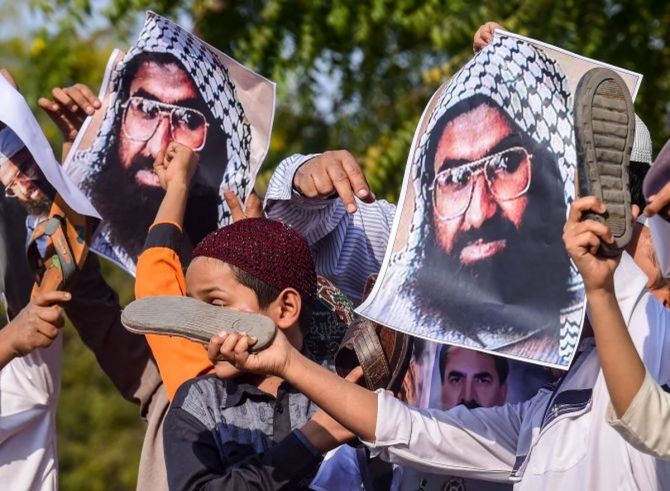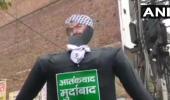An anti-terrorism court in Pakistan on Thursday issued an arrest warrant for banned Jaish-e-Mohammad (JeM) chief Masood Azhar on the charges of terror financing, days after another dreaded terrorist and Zaki-ur-Rehman Lakhvi was arrested in Lahore on similar charges.

The Anti-Terrorism Court (ATC) Gujranwala issued the warrant during a hearing in a terror financing case instituted by the Counter Terrorism Department (CTD) of Punjab police against some members of the JeM.
"ATC Gujranwala judge Natasha Naseem Supra issued an arrest warrant for Masood Azhar and directed the CTD to arrest him and present him in the court. The CTD told the judge the JeM chief was involved in terror financing and selling jihadi literature," an official told PTI.
He said the ATC judge issued the arrest warrant for Azhar on the request of a CTD inspector.
Azhar is believed to be hiding in a 'safe place' in his native town -- Bahawalpur.
Sources in New Delhi said that under pressure from the Financial Action Task Force (FATF), Pakistan has acknowledged Azhar's presence on its territory. Pakistan is trying to improve its global standing and to wriggle out of the global terror financing watchdog Financial Action Task Force's grey list.
Following the Palwama terror attack in February 2019 in India, Pakistan's Punjab province police had launched a crackdown on terrorism financing and in this connection arrested six activists of the JeM in Gujranwala, some 130kms from Lahore.
The CTD said its teams raided the whereabouts of the JeM's 'safe house' and arrested its members -- Muhammad Afzal, Muhammad Amir, Allah Ditta, Muhammad Iftikhar, Muhammad Ajmal and Muhammad Bilal Makki -- and recovered lakhs of rupees from their possession.
"The suspects were collecting funds to finance activities of JeM. The chargesheet against them has been submitted to the Anti-Terrorism Court Gujranwala and they are being interrogated," the CTD said.
Following immense international pressure after the Pulwama attack, the Pakistan government had arrested over 100 members of banned militant outfits including the JeM chief's son and brother.
The government also took control of the JeM, Mumbai terror attack mastermind Haifiz Saeed's Jamaat-ud-Dawah (uD) and Falahai Insaniat Foundation (FIF) properties including seminaries and mosques across the country.
JeM had claimed responsibility for the Pulwama terror attack that killed 40 Central Reserve Police Force soldiers.
Pakistan's Punjab government claimed to have taken over the administrative control of the JeM headquarters -- comprising Madressatul Sabir and Jama-e-Masjid Subhanallah -- in Bahawalpur.
According to the government, some 600 students are studying there and none of them is associated with any banned outfit or involved in any terror activity.
In May 2019, the United Nations designated Azhar a "global terrorist" after China lifted its hold on a proposal to blacklist the Pakistan-based JeM chief, a decade after New Delhi approached the world body for the first time on the issue.
The United Nations committee listed Azhar on May 1, 2019 as being associated with Al Qaeda for 'participating in the financing, planning, facilitating, preparing, or perpetrating of acts or activities by, in conjunction with, under the name of, on behalf of, or in support of', 'supplying, selling or transferring arms and related material to', 'recruiting for', 'otherwise supporting acts or activities of', and 'other acts or activities indicating association with' the JeM.
Azhar is a fugitive released by India in exchange of passengers of the hijacked Indian Airlines plane IC-814 in 1999.
After his release in 1999, Azhar formed the Jaish-e-Mohammed and scripted many audacious terror strikes in India.
On February 26, 2019 India had launched air strikes on what was said to be JeM's biggest training camp in Pakistan's Balakot.
The FATF is instrumental in pushing Pakistan to take measures against terrorists roaming freely in Pakistan and using its territory to carry out attacks in India and elsewhere.
The Paris-based FATF placed Pakistan on the Grey List in June 2018 and asked Islamabad to implement a plan of action to curb money laundering and terror financing by the end of 2019 but the deadline was extended later on due to COVID-19 pandemic.
The FATF further decided to retain Pakistan on its 'grey list' till February 2021 as it failed to fulfill six key obligations, including failure to take action against two of India's most wanted terrorists -- Hafiz Saeed and Masood Azhar.
In 2020, Saeed was sentenced for a collective imprisonment of 36 years on terror financing charges in four cases.
On January 2, Pakistan announced that it has arrested Mumbai attack mastermind and Lashkar-e-Taiba (LeT) operations commander Lakhvi in Lahore on terror financing charges.









